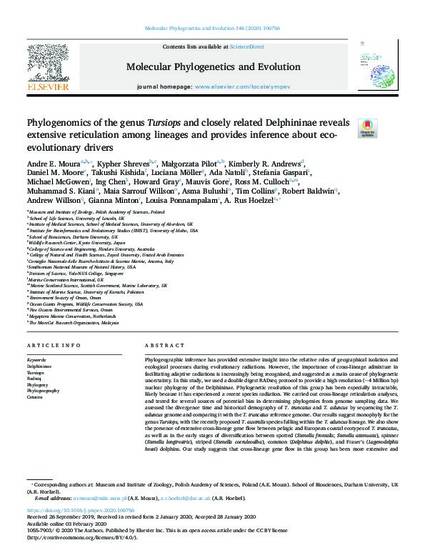
© 2020 The Authors Phylogeographic inference has provided extensive insight into the relative roles of geographical isolation and ecological processes during evolutionary radiations. However, the importance of cross-lineage admixture in facilitating adaptive radiations is increasingly being recognised, and suggested as a main cause of phylogenetic uncertainty. In this study, we used a double digest RADseq protocol to provide a high resolution (~4 Million bp) nuclear phylogeny of the Delphininae. Phylogenetic resolution of this group has been especially intractable, likely because it has experienced a recent species radiation. We carried out cross-lineage reticulation analyses, and tested for several sources of potential bias in determining phylogenies from genome sampling data. We assessed the divergence time and historical demography of T. truncatus and T. aduncus by sequencing the T. aduncus genome and comparing it with the T. truncatus reference genome. Our results suggest monophyly for the genus Tursiops, with the recently proposed T. australis species falling within the T. aduncus lineage. We also show the presence of extensive cross-lineage gene flow between pelagic and European coastal ecotypes of T. truncatus, as well as in the early stages of diversification between spotted (Stenella frontalis; Stenella attenuata), spinner (Stenella longirostris), striped (Stenella coeruleoalba), common (Delphinus delphis), and Fraser's (Lagenodelphis hosei) dolphins. Our study suggests that cross-lineage gene flow in this group has been more extensive and complex than previously thought. In the context of biogeography and local habitat dependence, these results improve our understanding of the evolutionary processes determining the history of this lineage.
- Cetacea,
- Delphininae,
- Phylogeny,
- Phylogeography,
- Radseq,
- Tursiops
Available at: http://works.bepress.com/ada-natoli/2/